Clash of the Titans - TT Tai Chi vs. CM Stacker 830
by Joshua Buss on February 23, 2006 12:05 AM EST- Posted in
- Cases/Cooling/PSUs
Cooler Master Stacker 830 (cont’d)
The last aspect of the 830 that needs to be addressed is its ability to morph into a BTX compatible system. In showing how this is possible, we'll also highlight some of the other fine details of this complex case. It all basically comes down to a very well designed motherboard tray. Notice how thumbscrews are used instead of problematic plastic clips to hold expansion cards down.
Since the main difference between ATX and BTX systems is the orientation of the expansion cards in relation to the I/O ports, those two components of the rear plate of the motherboard tray are separate, and can be put back into the tray reversed.
After removing a total of six screws, the two panes of the back hinged right off. Once off, they can be attached to each other in reverse – exactly how BTX motherboards are laid out.
After assembling the motherboard tray in its reversed configuration, the tray is slid into the opposite set of rails in the case. Next comes the fan juggling.
The fans, fan cages, and fan grills are all interchangeable on the Stacker 830. The unit on the far left is a fan in its cage, the unit in the center adds the grill, and the unit on the right is simply an empty cage with grill. Each of these are needed in various places, but generally, the unit on the far left goes at the rear or top of the case, the unit in the center goes at the front if one wants additional air to be brought in at the front, and the unit at the far right is a passive vent that fits in front of the BTX duct.
In this shot for instance, three of the standard bay place-holders have been removed in favor of the single cage and cover unit. In the bays themselves, one may install the BTX duct to direct air appropriately in terms of the BTX specification.
Lastly, here are a couple of shots of the lighting of the case. In a completely dark room, a well-loaded 830 can put on quite a show.
And the aforementioned power button:
The last aspect of the 830 that needs to be addressed is its ability to morph into a BTX compatible system. In showing how this is possible, we'll also highlight some of the other fine details of this complex case. It all basically comes down to a very well designed motherboard tray. Notice how thumbscrews are used instead of problematic plastic clips to hold expansion cards down.
Since the main difference between ATX and BTX systems is the orientation of the expansion cards in relation to the I/O ports, those two components of the rear plate of the motherboard tray are separate, and can be put back into the tray reversed.
After removing a total of six screws, the two panes of the back hinged right off. Once off, they can be attached to each other in reverse – exactly how BTX motherboards are laid out.
After assembling the motherboard tray in its reversed configuration, the tray is slid into the opposite set of rails in the case. Next comes the fan juggling.
The fans, fan cages, and fan grills are all interchangeable on the Stacker 830. The unit on the far left is a fan in its cage, the unit in the center adds the grill, and the unit on the right is simply an empty cage with grill. Each of these are needed in various places, but generally, the unit on the far left goes at the rear or top of the case, the unit in the center goes at the front if one wants additional air to be brought in at the front, and the unit at the far right is a passive vent that fits in front of the BTX duct.
In this shot for instance, three of the standard bay place-holders have been removed in favor of the single cage and cover unit. In the bays themselves, one may install the BTX duct to direct air appropriately in terms of the BTX specification.
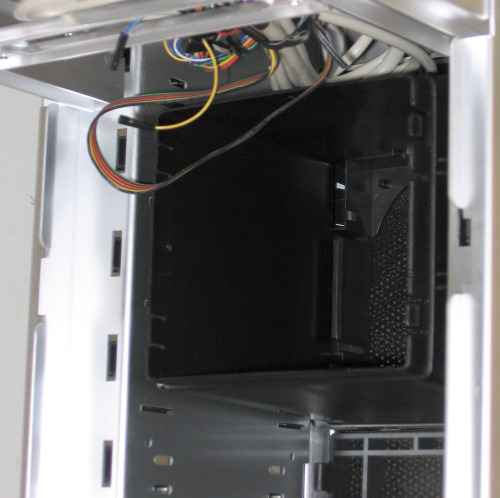
Lastly, here are a couple of shots of the lighting of the case. In a completely dark room, a well-loaded 830 can put on quite a show.
And the aforementioned power button:
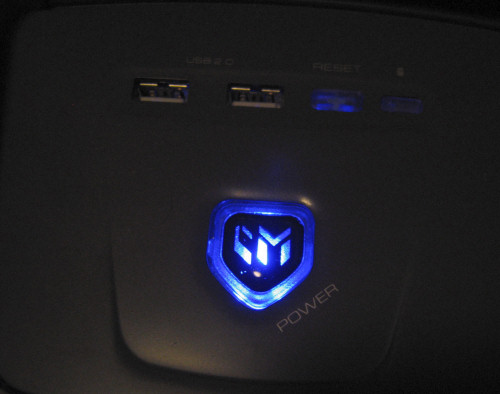


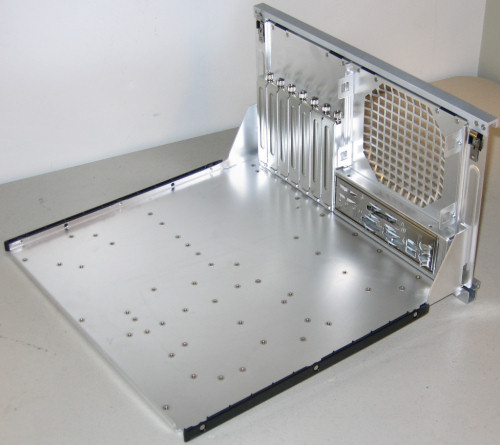
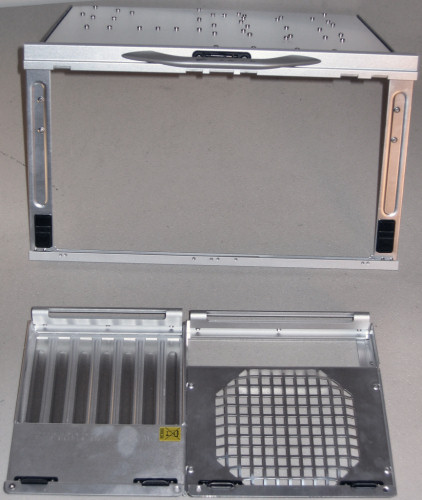
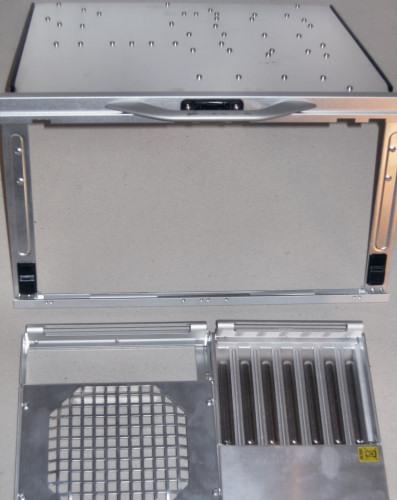
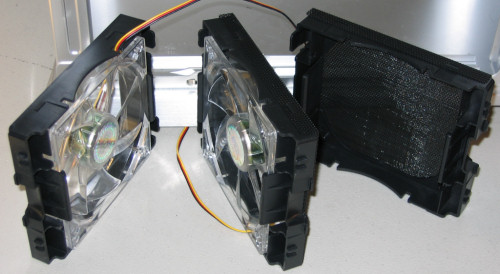
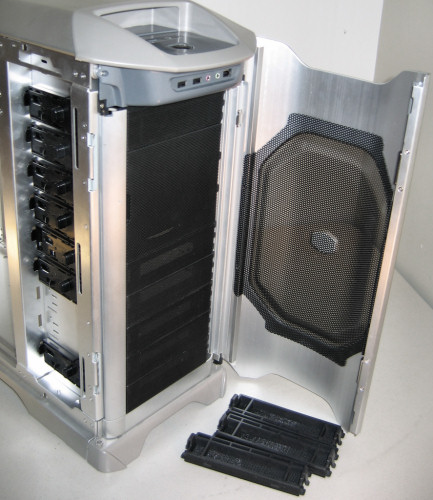
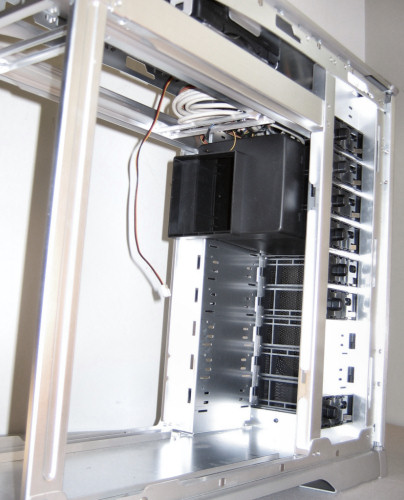
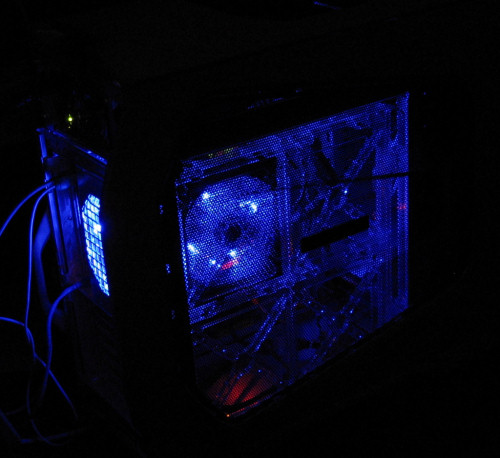








55 Comments
View All Comments
JoshuaBuss - Thursday, February 23, 2006 - link
What about direct links to images? Does that work?http://images.anandtech.com/reviews/cases/roundups...">http://images.anandtech.com/reviews/cases/roundups...
Jojo7 - Thursday, February 23, 2006 - link
No.JoshuaBuss - Thursday, February 23, 2006 - link
Try a refresh. Sometimes the image server gets a bit bogged down.latino666 - Thursday, February 23, 2006 - link
Still can't get crap. I notice this problem also with the newegg article too. Man oh man did I want to see those pics.ATWindsor - Thursday, February 23, 2006 - link
The tai-chi has gigantic heat-sinks on the side, but to me they seem like little more then a gimmick. Almost nothing is in physical contact with them, and when they are only taking heat fom air, they seem to be virtually useless. I bet the diffrences if one had a "standard" side would be hardly measurable.The CM 830 surly is more ugly than the old model IMHO, It doesn't quit have that "large clean beast"-feeling anymore.
Cygni - Thursday, February 23, 2006 - link
It seems they were going for the look of the Zalman completly fanless case, but didnt bother to install the flush mount PSU or heatpipes that ran into the doors, haha. :p Oh well.Tamale - Thursday, February 23, 2006 - link
I'd call it a 'large techno beast' now ;)Howard - Thursday, February 23, 2006 - link
The 3/8" holes in the Tai Chi can easily be bored out with a twist drill bit (the regular ones) in a cordless drill. At least, they would be if the material is aluminum, and I think it is.JoshuaBuss - Thursday, February 23, 2006 - link
Yah, but it's still much easier when it can be taken apart and pieces can be worked on individually.Googer - Thursday, February 23, 2006 - link
Could you invert the motherboard on the CM Stacker by installing the tray on the left side in place of the usual right side? If you could possibly allow for better CPU cooling sine the processor would be sitting on the bottome getting plenty of cool air and allowing hot exhaust to escape upwards.